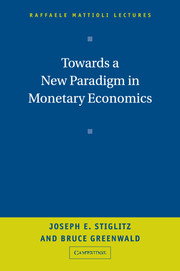Book contents
- Frontmatter
- Contents
- List of figures and table
- The Raffaele Mattioli Lectures
- Preface
- Part I The principles of the new paradigm
- 1 Reflections on the current state of monetary economics
- 2 How finance differs
- 3 The ideal banking system
- 4 Restricted banking (or, the banking system of today)
- 5 Market equilibrium
- 6 From the corn economy to the monetary economy
- 7 Towards a general equilibrium theory of credit
- Part II Applications of the new paradigm
- Bibliography
- Index
7 - Towards a general equilibrium theory of credit
Published online by Cambridge University Press: 12 May 2010
- Frontmatter
- Contents
- List of figures and table
- The Raffaele Mattioli Lectures
- Preface
- Part I The principles of the new paradigm
- 1 Reflections on the current state of monetary economics
- 2 How finance differs
- 3 The ideal banking system
- 4 Restricted banking (or, the banking system of today)
- 5 Market equilibrium
- 6 From the corn economy to the monetary economy
- 7 Towards a general equilibrium theory of credit
- Part II Applications of the new paradigm
- Bibliography
- Index
Summary
So far, we have argued that a central determinant of the level of economic activity is the supply of credit, which is different, in many ways, from the supply of ordinary goods and services, and that the most important institution in determining the supply of credit is the banking system. Credit is, however, a far more pervasive phenomenon in a modern society. Whenever one delivers a good to someone else without an immediate exchange of money or goods of full value, credit is extended. Traditionally, suppliers provide credit to their customers, who supply credit to theirs. In some cases, purchasers extend credit to suppliers, to enable them to produce the inputs that they wanted.
In each of these cases, the central question that the provider of credit has to ask is: What is the probability that the contract will be fulfilled? Will she be fully paid, or will the goods that have been paid for be delivered? Central to this query is information: information not only about the economic status of the party, but also about the incentive structures that the party faces. Every time, the party providing the credit has to ascertain both the risks involved and her ability and willingness to bear that risk. In effect, all of the questions crucial to modeling banks' supply of credit are relevant in determining the supply of credit by firms, households, or non–bank financial institutions.
- Type
- Chapter
- Information
- Towards a New Paradigm in Monetary Economics , pp. 137 - 150Publisher: Cambridge University PressPrint publication year: 2003



